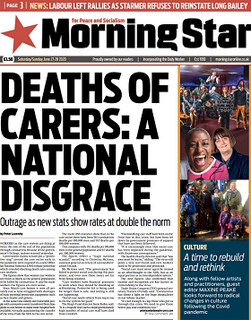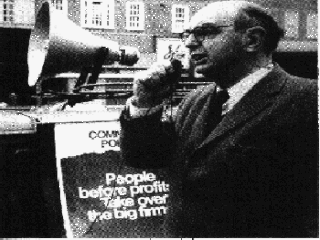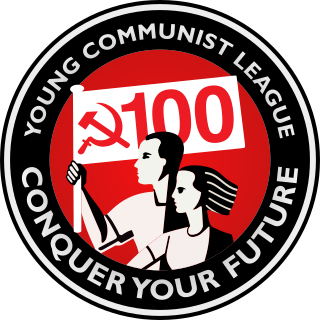Related Research Articles

The Morning Star is a left-wing British daily newspaper with a focus on social, political and trade union issues, and is both the largest and longest-running socialist newspaper in Britain. Originally founded in 1930 as the Daily Worker by the Communist Party of Great Britain (CPGB), ownership was transferred from the CPGB to an independent readers' co-operative in 1945. The paper was then renamed and reinvented as the Morning Star in 1966. The paper describes its editorial stance as in line with Britain's Road to Socialism, the programme of the Communist Party of Britain.

The Communist Party of Great Britain is a political group which publishes the Weekly Worker newspaper. The CPGB (PCC) claims to have "an internationalist duty to uphold the principle, 'One state, one party'. To the extent that the European Union becomes a state then that necessitates EU-wide trade unions and a Communist Party of the EU". In addition, it is in favour of the unification of the entire working class under a new Communist International. It is not to be confused with the former Communist Party of Great Britain, the Communist Party of Great Britain (Marxist–Leninist), or the current Communist Party of Britain.

The New Communist Party of Britain is a communist political party in Britain. The origins of the NCP lie in the Communist Party of Great Britain from which it split in 1977. The organisation takes an anti-revisionist stance on Marxist-Leninism and is opposed to Eurocommunism. After the fall of the Soviet Union the party was one of two original British signatories to the Pyongyang Declaration in 1992. It publishes a newspaper named The New Worker.
The Weekly Worker is a newspaper published by the Communist Party of Great Britain (CPGB-PCC). The paper is known on the left for its polemical articles, and for its close attention to Marxist theory and the politics of other Marxist groups. It claims an online readership averaging over 20,000 a week, but prints only 500 copies a week.
James "Jock" Ritchie Haston (1913–1986) was a Trotskyist politician and General Secretary of the Revolutionary Communist Party in Great Britain.
Andrew Philip Drummond-Murray, commonly known as Andrew Murray, is a British trade union and Labour Party official and activist. Murray was seconded from Unite the Union to Labour headquarters for the 2017 United Kingdom general election, subsequently becoming an adviser to Jeremy Corbyn from 2018 to 2020.

The British Left is a range of political parties and movements in the United Kingdom. These can take the position of either centre-left, left-wing or far-left.
Seumas Patrick Charles Milne is a British journalist and political aide. He was appointed as the Labour Party's Executive Director of Strategy and Communications in October 2015 under Labour Party Leader Jeremy Corbyn, initially on leave from The Guardian. In January 2017, he left The Guardian in order to work for the party full-time. He later left his role upon Corbyn's departure as Leader in April 2020.

Sid French (1920–1979) was a British communist activist and organiser, former Surrey district secretary of the Communist Party of Great Britain (CPGB) and the founding general secretary of the New Communist Party of Britain.
The International Marxist Group (IMG) was a Trotskyist group in Britain between 1968 and 1982. It was the British Section of the Fourth International. It had around 1,000 members and supporters in the late 1970s. In 1980, it had 682 members; by 1982, when it changed its name to the Socialist League, membership had fallen to 534.

The Communist Party of Britain (CPB) is a communist political party in Great Britain committed to Marxist–Leninist theory. The party emerged from a dispute between Eurocommunists and Marxist-Leninists in the Communist Party of Great Britain in 1988.
Socialism in the United Kingdom is thought to stretch back to the 19th century from roots arising in the aftermath of the English Civil War. Notions of socialism in Great Britain have taken many different forms from the utopian philanthropism of Robert Owen through to the reformist electoral project enshrined in the birth of the Labour Party.

The Young Communist League (YCL) was the youth wing of the Communist Party of Great Britain from 1921 to 1988. Since 1991, the YCL has been the youth section of the Communist Party of Britain.

The British Socialist Party (BSP) was a Marxist political organisation established in Great Britain in 1911. Following a protracted period of factional struggle, in 1916 the party's anti-war forces gained decisive control of the party and saw the defection of its pro-war right wing. After the victory of the Bolshevik Revolution in Russia at the end of 1917 and the termination of the First World War the following year, the BSP emerged as an explicitly revolutionary socialist organisation. It negotiated with other radical groups in an effort to establish a unified communist organisation, an effort which culminated in August 1920 with the establishment of the Communist Party of Great Britain. The youth organisation the Young Socialist League was affiliated with the party.

The Communist Party of Great Britain (CPGB) was the largest communist party in Great Britain between 1920 and 1991. Founded in 1920 through a merger of several smaller Marxist parties, the CPGB gained the support of many socialist organisations and trade unions following the political fallout of the First World War and the Russian October Revolution. Ideologically the CPGB was a socialist party organised upon Marxism–Leninist ideology, strongly opposed to British colonialism, sexual discrimination, and racial segregation. These beliefs led many leading anti-colonial revolutionaries, feminists, and anti-fascist figures, to become closely associated with the party. Many prominent CPGB members became leaders of Britain's trade union movements, including Jessie Eden, Abraham Lazarus, Ken Gill, Clem Beckett, GCT Giles, Mike Hicks, and Thora Silverthorne.
Left Unity is a left-wing political party in the United Kingdom founded in 2013 when film director and social campaigner Ken Loach appealed for a new party to replace the Labour Party. More than 10,000 people supported Loach's appeal.
The Revolutionary Communist Party was a British Trotskyist group, formed in 1944 and active until 1949, which published the newspaper Socialist Appeal and a theoretical journal, Workers International News.
Proletarian was a journal produced by a small far-left organisation active in the United Kingdom in the 1980s, which is generally also referred to as Proletarian. The organisation was known for its extreme pro-Soviet stance.

Far-left politics in the United Kingdom have existed since at least the 1840s, with the formation of various organisations following ideologies such as Marxism, revolutionary socialism, communism, anarchism and syndicalism.
The Socialist Party of Ireland (SPI) was a small political party in Ireland associated with James Connolly.
References
- 1 2 3 Mosbacher, Michael (December 2015). "The Stalinist Past Of Corbyn's Strategist". Standpoint. Retrieved 7 April 2016.
- ↑ Labour Monthly, Vols. 62-63, p. 146
- ↑ http://www.thesocialistcorrespondent.org.uk/
- ↑ "Introducing Corbyn's new spinner: the Straight Left comrade from Mandelson's communist days". The Spectator. 27 February 2017. Retrieved 27 February 2017.
- ↑ Singleton, David (26 February 2017). "Jeremy Corbyn gets new spin doctor… as Shami Chakrabarti hits out at the media". Total Politics. Retrieved 27 February 2017.